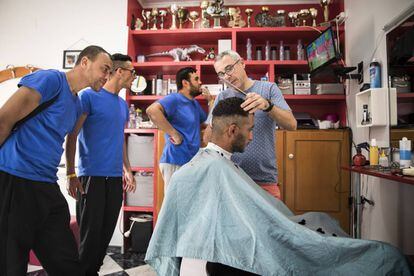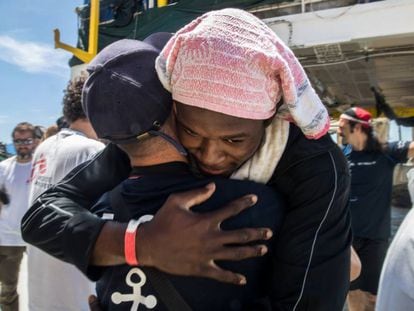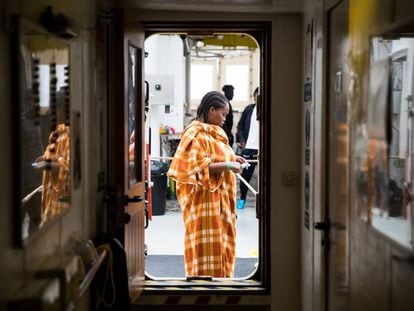‘Aquarius’ migrants begin new life with a SIM card and a haircut
EL PAÍS follows four Algerians from the rescue ship as they enter this new chapter


They don’t like cameras but they were surrounded by them when they left the refugee center yesterday. Reporters asked them where they were from, their names, how they were feeling but only one of them spoke English and they were in a rush.
Half of the 630 migrants from the ‘Aquarius’ want to go to France
Salidm, Anwer, Djamel and Yacine (not their real names) are four young Algerians who arrived in Valencia aboard the Orione, one of the two Italian Coast Guard vessels that accompanied the Aquarius to Valencia. The four met in Libya where they had gone to save up money. On June 9, they boarded a precarious 12-meter long boat with around 100 other people. They paid €1,000 for the journey. Their boat capsized. After being rescued at sea, the four spent eight days on a ship under the open sky without anything to keep them warm.
The Spanish government agreed to welcome the rescue boat and now the Algerians have a new start in life. But first they need to do basic things, like shave their prickly beards and buy a SIM card, nail clipper, and a new shirt so they are not all dressed the same. They don’t know where to go. But while their shelter appears to be in the middle of nowhere, it is just a few kilometers from the shopping center in Cheste. EL PAÍS accompanied them on their first outing in Spain.
“There’s no one in the street!” they exclaim. It’s midday and even in the shade the heat is unbearable. Their main goal is to buy a SIM card so they can contact their families. Their families know that they are alive because they saw them on French television. They were also able to make a call as soon as they arrived on Sunday.
We still need to sleep, speak with lawyers and think about what to do. For now, we are alive ‘Aquarius’ migrants
It has been a long time since the four left their homes. Yacine, a computer programmer who worked at a restaurant in Tripoli, left three years ago. He didn’t want to come to Europe but when the war broke out he saw no other option. “I couldn’t live there. They rob you of everything. If you don’t give them what you have, they kill you. That’s how I lost my documents. It is a terrible country,” he explains.
In their bag, they are carrying three important documents: a permit to stay in Spain for 45 days, a request for international protection and a document expressing their desire to go to France – but none can be used to buy a SIM card. They don’t have any identification, only a yellow bracelet on their wrist.
“Four came in this morning and I couldn’t do anything for them. The system forces you to enter an identification document,” explains the shopkeeper. As they wait, they play on the Foosball machine against two kids who have just finished school.
At 2pm all the shops in town are closed. They have to wait. The four eat in a restaurant and try gazpacho and Russian salad for the first time. They turn up their nose when they see a ham sandwich on a plate of white asparagus. According to the Algerians, they were given ham to eat on the Italian ship and told it wasn’t pig. “It was a lie. But I ended up eating it because I was so exhausted and hungry. My religion doesn’t allow me to eat pig,” Yacine explains. The military officers on the Orione were not particularly friendly to the migrants. Communication was “sit down, don’t move, don’t scream, go to sleep.”
From the table at the restaurant, they can see the reflection of a television broadcast. It shows images of a ship and a mass of people in orange life jackets. “Look! It’s the Aquarius.” But it isn’t. These are the latest migrants to have arrived in Andalusia.
Communication with the Italian military was “sit down, don’t move, don’t scream, go to sleep”
The Algerians try to be generous. They insist on giving a euro to a man who doesn’t have enough to buy a yogurt. The day continues in the supermarket where they buy razors and moisturizing cream for their burned skin. In a Chinese-run bazar, they buy travel bags and a new shirt before finally heading to the hairdresser. They want a close shave and their hair cut like an American marine. “Don’t ask us why, we like it like this,” says Yacine, just before he grabs a broom and helps the barber sweep. The hairdresser, José Linares, does not charge the Algerians. They thank him effusively.
The four are not sure about their plans. Three of them have a relative in France but they don’t know if they will be accepted there, despite the French government’s offer to accept Aquarius migrants.
In the next couple of days, French agents from OFPA, the office in charge of asylum seekers, will arrive in Valencia to review each of the requests to enter Spain. They have a lot of work ahead. Half of the 630 migrants on the Aquarius want to go to France, according to Spain’s Deputy Prime Minister Carmen Calvo. If they are not accepted, they will spend 45 days in Spain and look for a way to regularize their situation. They don’t believe they will be granted asylum: their lives were at risk in Libya but not in their country. “We have a lot of doubts,” they explain. “We still need to sleep, speak with lawyers and think about what to do. For now, we are alive.”
English version by Melissa Kitson.












































